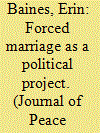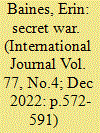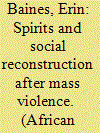|
|
|
Sort Order |
|
|
|
Items / Page
|
|
|
|
|
|
|
| Srl | Item |
| 1 |
ID:
171201


|
|
|
|
|
| Summary/Abstract |
In this article, we examine exceptional circumstances in which men who father children born as the result of conflict-related sexual violence assume full or partial responsibility for their child's well-being. Children ‘born of war’ are increasingly recognized as a particular victim group in relevant international policy frameworks. Their social status falls somewhere between the victimization of their mother and perpetration of their father. Given the circumstances of their birth, they often experience social rejection and loss of identity with a long-term impact on their well-being. Previous scholarship has primarily documented the challenges faced by their mothers as caregivers and as victims of wartime sexual violence. A discussion on fathers to children ‘born of war’ is absent, attributable not only to their perpetrator status, but also to the assumption that their identity is unknown or that a relationship between father and child is undesired. The article demonstrates this is not always the case. Based on research in northern Uganda between 2016 and 2019 which included interviews and focus group discussions with former male combatants in the rebel group the Lord's Resistance Army, we explore how some fathers seek to maintain a relationship with children born as the result of ‘forced marriage’ and assume partial or full responsibility for their well-being and care.
|
|
|
|
|
|
|
|
|
|
|
|
|
|
|
|
| 2 |
ID:
132354


|
|
|
|
|
| Publication |
2014.
|
| Summary/Abstract |
One of the most vexing contradictions about the Uganda originated rebel group, the Lord's Resistance Army (LRA), is the fact that it institutionalized forced marriage on the one hand, while actively discouraging sexually immoral behavior on the other: rape, sexual violence, and promiscuity both within the group and outside it were punishable by severe beating or death. What explains this contradiction? The article suggests that in addition to maintaining discipline and control over a diverse and reluctant group, forced marriage and the regulation of sexual relations reproduced a political project of imagining a 'new Acholi' nation. The article draws on original data collected in focus group discussions with former commanders and wives to commanders to discuss the historical evolution of this vision, how the LRA enforced rules regarding sexual behavior, and finally, the way forced marriage implicated women and girls in the organization of power and domination in the group until it was forced from permanent bases in Sudan in 2002.
|
|
|
|
|
|
|
|
|
|
|
|
|
|
|
|
| 3 |
ID:
192924


|
|
|
|
|
| Summary/Abstract |
Breaking the silence around wartime sexual violence is often understood as paramount to ending it. Many survivors feel compelled to publicly testify to prevent future harms, contest denial, and hold perpetrators to account. Yet, testimony is not always spoken, and silence should not be elided with powerlessness. In this article, we conceptualize the space in-between silence and voice as a form of multi-modal testimony that is given to protect, sustain, and reimagine relationships. We consider this in relation to the efforts of Adok, a woman abducted and forced into marriage by a rebel group in northern Uganda. Following her escape and return home with two children, Adok faced what is described as the “secret war”: ongoing structural and lateral violence. Her efforts to hold the father of her children to account attests to the “secret war,” and calls for a collective response to protect the future of her children.
|
|
|
|
|
|
|
|
|
|
|
|
|
|
|
|
| 4 |
ID:
098084


|
|
|
|
|
| Publication |
2010.
|
| Summary/Abstract |
A vibrant debate in the field of transitional justice concerns the relative ability of global, national, and local mechanisms to promote justice after violent conflict. Discussion largely focuses on more formal mechanisms of justice (courts, tribunals, or truth commissions), implying that state institutions and the law are solely responsible for shaping the process of social healing. This article suggests that scholars should take seriously more informal, socio-cultural processes outside the purview of the state, particularly for how they promote social reconstruction at the micro level. Examining the phenomena of spirit possession and ritual cleansing in northern Uganda, I illustrate how such efforts are expressions of injustice and reflect ordinary people's attempts to seek moral renewal and social repair. This approach is particularly illustrative in cases where 'intimate enemies' exist - that is, settings where ordinary people who engaged in violence against one another must live together again.
|
|
|
|
|
|
|
|
|
|
|
|
|
|
|
|
| 5 |
ID:
113725


|
|
|
|
|
| Publication |
2012.
|
| Summary/Abstract |
The security of civilians in contemporary conflicts continues to tragically elude humanitarians. Scholars attribute this crisis in protection to macro-structural deficiencies, such as the failure of states to comply with international conventions and norms and the inability of international institutions to successfully reduce violence by warring parties. While offering important insights into humanitarianism and its limits, this scholarship overlooks the potential of endogenous sources of protection - the agency of civilians. On the basis of a case study of northern Uganda, we identify and discuss several civilian self-protection strategies, including (a) attempts to appear neutral, (b) avoidance and (c) accommodation of armed actors, and argue that each of these is shaped by access to local knowledge and networks. We illustrate how forced displacement of civilians to 'protected villages' limited access to local knowledge and, in turn, the options available to civilians in terms of self-protection. Analyses of the intersections of aid and civilian agency in conflict zones would afford scholars of humanitarianism greater explanatory insight into questions of civilian protection. The findings from our case study also suggest ways in which aid agencies could adopt protection strategies that empower - or at least do not obstruct - the often-successful protection strategies adopted by civilians.
|
|
|
|
|
|
|
|
|
|
|
|
|
|
|
|
| 6 |
ID:
186064


|
|
|
|
|
| Summary/Abstract |
Disarmament, demobilization, and reintegration (DDR) processes will often dismantle the command-and-control structures of non-state armed groups (NSAGs) to prevent possible remobilization. Recent studies demonstrate that in some cases ex-combatant networks provide important social and economic support that hasten transitions to civilian life; however, this literature focuses exclusively on networks that emerge among commanders, peers, and foot soldiers. In this article, we broaden existing literature on ex-combatant networks by examining the role that family relations play in combatants’ war and post-war trajectory. Drawing on 18 life history interviews with former male combatants from the Lord’s Resistance Army (LRA) we argue that the familial can often be as influential as peer-relations. Specifically, our study shows that, first, familiies can shape the defection, demobilization, and reintegration processes of ex-combatants, and, second, ex-combatant networks can play an important role in facilitating the reunion of families in the aftermath of war. The endurance of familial relations forged within NSAGs pose important considerations to DDR policies.
|
|
|
|
|
|
|
|
|
|
|
|
|
|
|
|
|
|
|
|
|